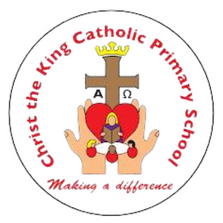Telephone +44 (0)1454 866680
SCIENCE
Our Mission Statement
'Making a difference by inspiring a love of life and learning for all. We build strong foundations within God's loving hands'.
Our Core Values
We provide a Catholic Christian education based on the life and teaching of Jesus Christ. Our Core Values. Our Core Values are inspired by Gospel values and stem from love - love is forgiveness, sharing and kindness. They are:
- Responsibility
- Compassion
- Respect
- Honesty
- Perseverance
- Courage
At Christ the King Catholic Primary School we inspire our children to have a lifelong love of learning through a broad, enriched and balanced curriculum. We aspire for all children to be the best they can be and make a difference to our world by building strong foundations within God’s loving hands.
Our Approach, Aim, and Curriculum
Our key curriculum drivers are:
- Inclusivity
- Creativity
- Curiosity
- Oracy
Intent
At Christ the King Catholic Primary School, we aim to inspire a lifelong curiosity about the world, through specific disciplines of biology, physics and chemistry. Teaching should give pupils the knowledge linked to how science has changed our lives and how it is vital to the world’s prosperity. Pupils will learn about plants, animals including humans, everyday materials and their uses, seasonal changes, living things and their habitat, rocks, light, forces and magnets, states of matter, sound, electricity, earth and space, and evolution and inheritance. Skills taught will cover how to work scientifically through asking questions, observing, conducting tests, gathering, recording and presenting data. As children move into Upper KS2, they will use these skills to make links, and demonstrate how findings can support or refute arguments. Science learning will be linked to other subject areas where applicable, developing our cross-curricular approach. The National Curriculum informs our chosen topics, which are sequential and include progression of skills. Through building up a body of key foundational knowledge and concepts, pupils should be encouraged to recognise the power of rational explanation and develop a sense of excitement and curiosity about natural phenomena. Children will understand how Catholic virtues and British Values relate to Science. There will be opportunities beyond the classroom for real life learning and for pupils to understand how science can be used to explain what is occurring, predict how things will behave, and analyse causes.
Implementation
Science is taught in (blocks) throughout the year so that children develop a deep and secure understanding. There are also links between science and other areas of the curriculum where appropriate and where it adds value to both the subjects. Skills are built on year on year and sequenced appropriately throughout the school and lessons are planned using this document. Monitoring occurs regularly by the Curriculum Leads.
Class teachers use National Curriculum statements to inform their planning. These statements provide teachers with programmes of study. Class teachers will then create lesson objectives and activities, guided by the National Curriculum statements. Teachers will also provide opportunities for scientific talk, enquiry and investigations, in relation to each programme of study as provided by the National Curriculum. Each year group follows a progression of content and skills, as detailed in the National Curriculum.
Each topic across the curriculum as a whole has a knowledge organiser which is shared with children and parents. This knowledge organiser will provide details of the science taught within that topic. There is also shared vocabulary and an entry/exit quiz as a method of assessment in Key Stage 2. Science lessons are scaffolded for those that need support to provide equality in provision and to maintain high standards of achievement for all pupils. Where possible, children will engage in practical investigations and experiments, using enquiry, hypothesis, observation, recording, evaluation and presentation skills.
Impact
Our principal aim is that children leave Christ the King with a wide range of happy and rich memories in RE formed through interesting and exciting experiences driven through an engaging and comprehensive curriculum which is the basis of knowledge and understanding of the Catholic faith, enabling them to develop a living and personal faith in Jesus Christ and allowing them to know and love God.
By the time pupils leave they will:
- Have good age appropriate knowledge of biology, chemistry and physics.
- Have good age appropriate enquiry and investigation skills.
- Be able to ask age appropriate scientific questions.
- Feel confident in using scientific vocabulary to discuss, explore and explain scientific concepts and ideas.
- Have an understanding of the nature, processes and methods of science.
- Are equipped with the scientific knowledge required to understand science today and in the future.
- Be able to conduct simple investigations and experiments
- Be able to discuss and present findings, and arrive at conclusions.
- Have a passion for science, and a real sense of curiosity to find out about the world
We will measure the impact of our curriculum through the following methods:
- In KS2 - assessment before and after using entry and exit quizzes based on the knowledge organisers.
- In KS1 – ‘What I already’ session at the start of each new science topic, and a ‘What I have learnt’ session at the end of a topic.
- Summative assessment of pupil discussions
- Images and videos of practical learning
- Pupil voice
- Moderation staff meetings
- Marking of written work in books
- Book-looks by Science lead

Christ the King Catholic Primary School is a Voluntary Aided primary school. Registered Office: Easton Hill, Road, Thornbury, Bristol. BS35 1AW
Christ the King Catholic Primary School
